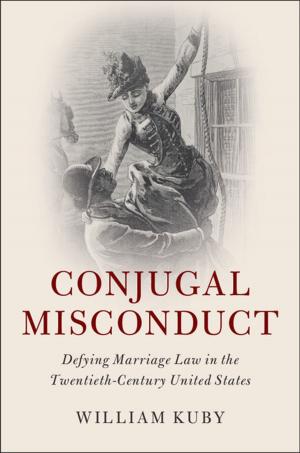Judging State-Sponsored Violence, Imagining Political Change
Nonfiction, Reference & Language, Law, Criminal law, Social & Cultural Studies, Political Science| Author: | Bronwyn Leebaw | ISBN: | 9781139063517 |
| Publisher: | Cambridge University Press | Publication: | April 18, 2011 |
| Imprint: | Cambridge University Press | Language: | English |
| Author: | Bronwyn Leebaw |
| ISBN: | 9781139063517 |
| Publisher: | Cambridge University Press |
| Publication: | April 18, 2011 |
| Imprint: | Cambridge University Press |
| Language: | English |
How should state-sponsored atrocities be judged and remembered? This controversial question animates contemporary debates on transitional justice and reconciliation. This book reconsiders the legacies of two institutions that transformed the theory and practice of transitional justice. Whereas the Nuremberg Trials exemplified the promise of legalism and international criminal justice, South Africa's Truth and Reconciliation Commission promoted restorative justice and truth commissions. Leebaw argues that the two frameworks share a common problem: both rely on criminal justice strategies to investigate experiences of individual victims and perpetrators, which undermines their critical role as responses to systematic atrocities. Drawing on the work of influential transitional justice institutions and thinkers such as Judith Shklar, Hannah Arendt, José Zalaquett and Desmond Tutu, Leebaw offers a new approach to thinking about the critical role of transitional justice – one that emphasizes the importance of political judgment and investigations that examine complicity in, and resistance to, systematic atrocities.
How should state-sponsored atrocities be judged and remembered? This controversial question animates contemporary debates on transitional justice and reconciliation. This book reconsiders the legacies of two institutions that transformed the theory and practice of transitional justice. Whereas the Nuremberg Trials exemplified the promise of legalism and international criminal justice, South Africa's Truth and Reconciliation Commission promoted restorative justice and truth commissions. Leebaw argues that the two frameworks share a common problem: both rely on criminal justice strategies to investigate experiences of individual victims and perpetrators, which undermines their critical role as responses to systematic atrocities. Drawing on the work of influential transitional justice institutions and thinkers such as Judith Shklar, Hannah Arendt, José Zalaquett and Desmond Tutu, Leebaw offers a new approach to thinking about the critical role of transitional justice – one that emphasizes the importance of political judgment and investigations that examine complicity in, and resistance to, systematic atrocities.















